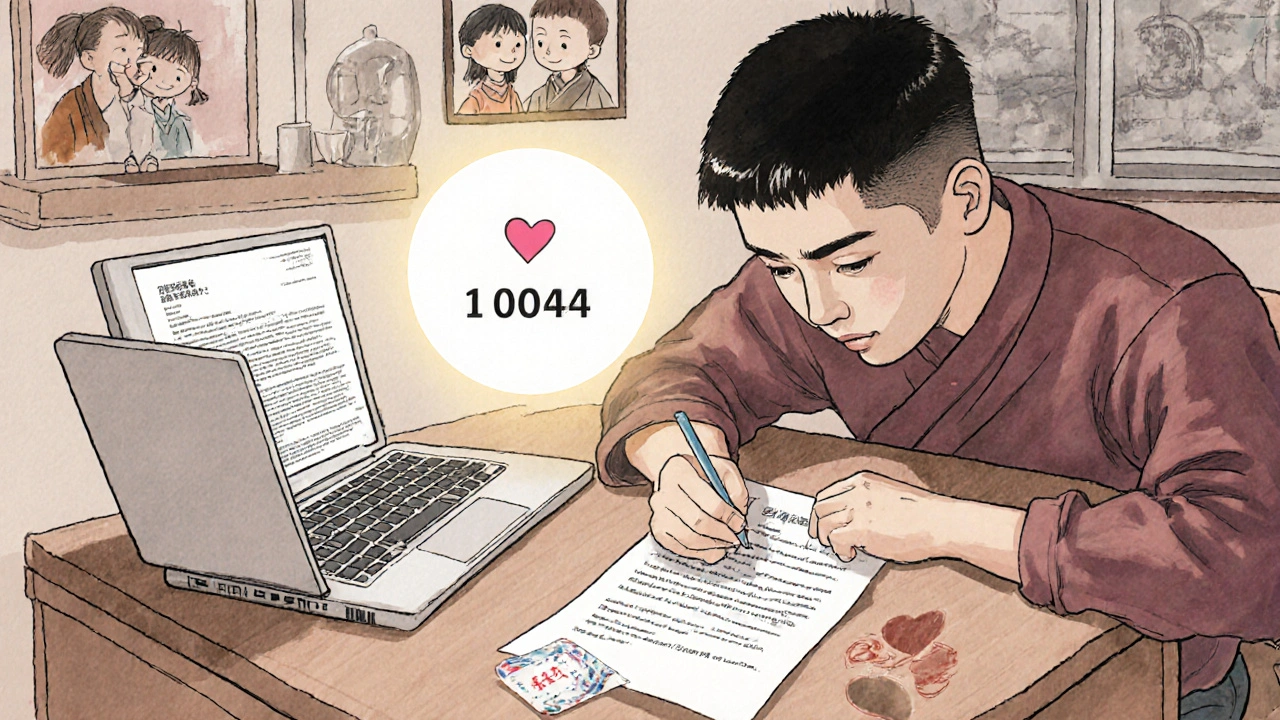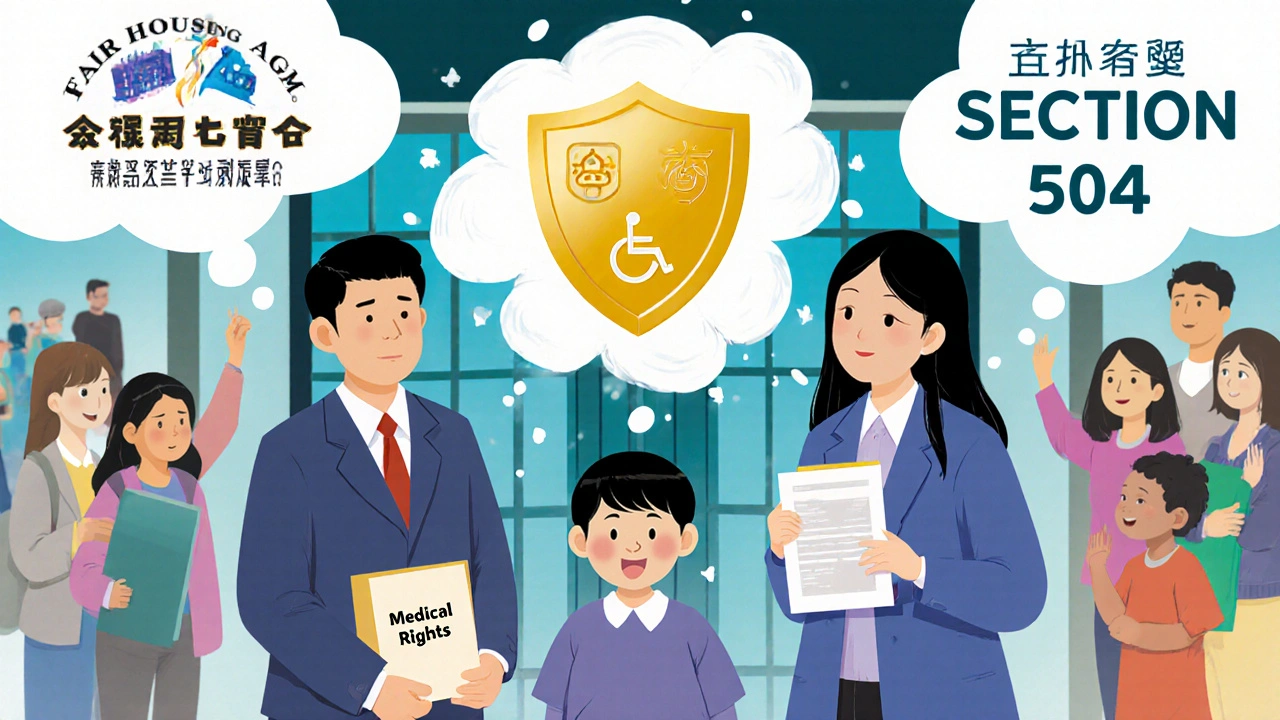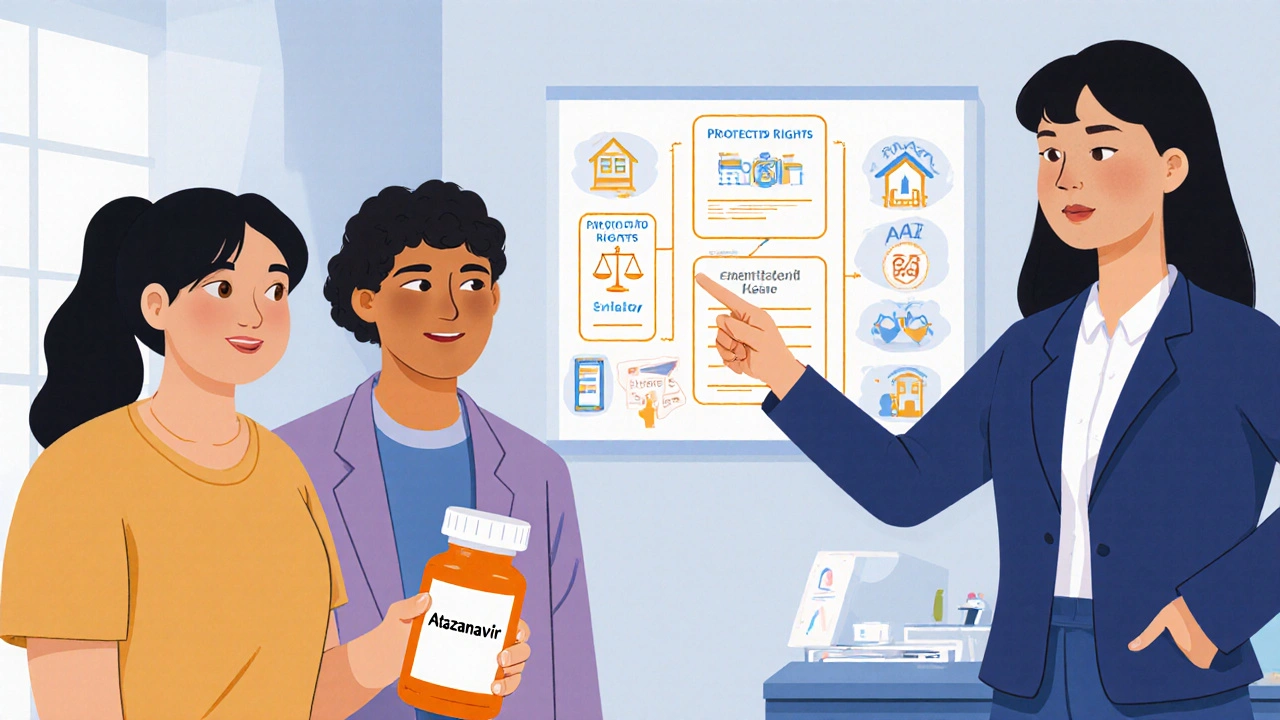When you’re taking atazanavir for HIV, your health isn’t the only thing that matters. Your legal rights are just as important-and often overlooked. Many people assume that if they’re prescribed a medication like atazanavir, the system will automatically protect their access, privacy, and dignity. But that’s not always true. Insurance denials, employer discrimination, housing issues, and even mistakes in medical records can put your treatment at risk. Knowing your rights isn’t just helpful-it’s necessary to stay healthy.
What atazanavir is and why it matters
Atazanavir is an antiretroviral drug used to treat HIV. It works by blocking an enzyme the virus needs to multiply, helping keep viral loads low and immune systems strong. It’s often part of combination therapy, taken with other drugs like tenofovir or emtricitabine. People who take atazanavir regularly can live long, healthy lives-many with undetectable viral loads, meaning they can’t transmit HIV sexually. But that only works if they can keep taking the medication without interruption.
Missing doses because of cost, stigma, or access issues can lead to drug resistance. That’s why legal protections around medication access aren’t just about fairness-they’re about survival.
Your right to access atazanavir
Under the Affordable Care Act (ACA), insurers can’t deny coverage for HIV medications like atazanavir because of pre-existing conditions. That sounds simple, but in practice, many people still face hurdles. Prior authorization requirements, step therapy rules, and narrow formularies can delay or block access.
If your insurance denies coverage for atazanavir, you have the right to appeal. Most plans have a formal process-you can request an external review if the internal appeal is denied. The Patient Advocate Foundation and AIDS Legal Referral Panel offer free help with these appeals. You don’t need a lawyer to start, but having someone who’s done this before can cut months off the process.
Medicaid and Medicare also cover atazanavir in most states. If you’re on Medicaid, check if your state has a Ryan White HIV/AIDS Program. These state-funded programs help pay for meds when insurance falls short. In 2024, over 50,000 people in the U.S. used Ryan White to cover HIV medications, including atazanavir.
Privacy and confidentiality
Your HIV status is protected under HIPAA. That means your doctor, pharmacist, and insurer can’t share that information without your written consent. But violations still happen. A receptionist mentioning your name in a waiting room. A pharmacy label that says "HIV Meds Only." An employer accidentally getting a report from a health plan.
If you suspect a breach, file a complaint with the U.S. Department of Health and Human Services Office for Civil Rights. You can do it anonymously. You don’t have to prove intent-just that the information was disclosed without permission. Many cases are resolved quickly once the organization knows they’re being watched.
Also, know your rights in the workplace. If you’re on atazanavir and need to adjust your schedule for side effects like nausea or fatigue, you may qualify for reasonable accommodations under the Americans with Disabilities Act (ADA). That could mean flexible hours, remote work, or extra breaks. You don’t have to disclose your diagnosis to request this-just say you have a medical condition that requires adjustments.

Protection from discrimination
People living with HIV still face discrimination, even in 2025. A landlord refusing to rent because you’re on HIV meds. A job offer pulled after a background check reveals you’re on antiretrovirals. A school denying enrollment to your child because a parent has HIV.
All of these are illegal under federal law. The Fair Housing Act, ADA, and Section 504 of the Rehabilitation Act all protect people with HIV from discrimination in housing, employment, education, and public services. You don’t have to prove malicious intent-only that the action was based on your HIV status or treatment.
Document everything. Save emails, notes from conversations, and copies of denials. Organizations like the Center for HIV Law and Policy can help you file complaints with the Department of Justice or the Department of Housing and Urban Development. Many cases settle before going to court, especially when there’s clear evidence.
Protecting your family
If you have children or dependents, their legal protections matter too. Under the Ryan White Program, family members can get counseling, testing, and support services-even if they’re not infected. Schools can’t require your child to be tested for HIV, and they can’t exclude them from activities because of your status.
Make sure your estate plan is in order. Designate a trusted person to manage your medical decisions if you’re unable to. Update your will and power of attorney to include your HIV medications and care preferences. Some people worry that listing atazanavir in legal documents will expose their status. It doesn’t have to. You can refer to "medications for a chronic health condition" instead of naming the drug.
Also, talk to your family about what to do if you’re hospitalized. Give them copies of your medication list, pharmacy contact info, and your advance directive. Many families are blindsided when a loved one is rushed to the ER and no one knows what drugs they’re on-or that they can’t stop them suddenly.

What to do if your rights are violated
If you’re denied atazanavir, harassed, or discriminated against, here’s what to do:
- Document everything-dates, names, what was said, any paperwork.
- Contact a legal aid organization-National AIDS Law Project, Lambda Legal, or your state’s HIV legal network.
- File a complaint with the right agency: HHS for HIPAA, EEOC for jobs, HUD for housing.
- Reach out to patient advocacy groups-They often have direct contacts at insurance companies and pharmaceutical manufacturers to help fast-track access.
You don’t have to fight alone. These organizations have helped thousands of people get their meds, their jobs, and their homes back. And many of them work on a sliding scale or for free.
How to stay proactive
Prevention is better than repair. Keep a folder-physical or digital-with:
- Your prescription and insurance card
- Names and numbers of your doctors and pharmacy
- A copy of your advance directive
- Proof of income or Medicaid/Medicare enrollment
- Contacts for legal aid groups in your state
Update it every six months. If you move, change insurers, or switch meds, update it immediately. This isn’t bureaucracy-it’s your safety net.
Final reminder: You are not alone
Atazanavir keeps you alive. But your legal rights keep you free. You have the right to treatment without shame. To work without fear. To live without being judged. These aren’t abstract ideals-they’re enforceable laws.
Don’t wait until something goes wrong to learn your rights. Start today. Call one legal aid group. Ask your pharmacist about patient assistance programs. Talk to your doctor about documenting your needs. Small steps now prevent big crises later.
Your health matters. Your dignity matters. And your rights? They’re not optional.
Can my employer fire me for taking atazanavir?
No. Under the Americans with Disabilities Act, HIV is considered a disability, and taking atazanavir is part of managing that condition. Employers cannot fire, demote, or refuse to hire someone because they are on HIV medication. Even if your employer finds out you have HIV, they cannot take adverse action unless your condition prevents you from performing essential job duties-and even then, they must offer reasonable accommodations first.
What if my insurance won’t cover atazanavir?
You have the right to appeal. Start by asking your doctor to write a letter of medical necessity. Then file an internal appeal with your insurer. If denied, request an external review by an independent third party. Many people get coverage after this step. If you’re low-income, contact the Ryan White HIV/AIDS Program in your state-they often cover medications when insurance doesn’t.
Can my landlord evict me because I’m on atazanavir?
No. The Fair Housing Act prohibits eviction or refusal to rent based on HIV status or medication use. Landlords cannot ask about your health conditions, require special deposits, or impose extra rules on you because you’re taking HIV drugs. If you’re threatened with eviction, contact your local Fair Housing Council or the Department of Housing and Urban Development immediately.
Is it safe to tell my family I’m taking atazanavir?
It’s your choice. Sharing your status can help your family support you, especially in emergencies. But you don’t owe anyone an explanation. If you’re worried about stigma, you can say you’re managing a chronic health condition without naming the drug. Legal protections exist regardless of whether others know your diagnosis.
Can my child be denied school because I take atazanavir?
Absolutely not. Schools cannot deny enrollment, isolate, or treat a child differently because a parent has HIV or takes HIV medication. This is protected under Section 504 of the Rehabilitation Act. Even if a school staff member is misinformed, they must follow federal law. If this happens, file a complaint with the Office for Civil Rights.


13 Comments
So if I’m on atazanavir and my boss finds out, they can’t fire me but they can make my life hell with extra meetings and "performance reviews" until I quit. That’s the real game.
They’re not telling you the whole story. Atazanavir? It’s not just medicine-it’s a tracking chip. The government funds it so they can monitor your movements, your meds, your heartbeat. You think HIPAA protects you? Nah. They’ve got backdoors. You’re being watched. Always.
OMG YES 😱 I got denied coverage last year and my insurance called me "high risk" like I was a terrorist. Then they sent me a letter with a barcode on it. I scanned it. It linked to my pharmacy, my doctor, my bloodwork. I cried for 3 hours. This isn’t healthcare-it’s surveillance capitalism. 💔
You’re not alone. I’ve helped 3 people appeal denials this year. Start with the Patient Advocate Foundation. They’re free, they’re fast, and they don’t judge. Just reach out. One call changes everything.
Man, this post is a lifeline. I’ve been on atazanavir for 8 years. Undetectable. Working remote. No one at my job knows. But I keep my docs in a cloud folder labeled "Health Notes" so my sister can find it if I pass out. Small steps, big safety net. 🙌
How can you trust any system that allows pharmaceutical companies to dictate your survival? Atazanavir costs $1,200 a month in the U.S., yet in India, it’s $12. Who decides who lives and who dies? This isn’t justice. This is colonialism with a prescription pad.
bro i read this whole thing and my brain just went "wait, so i can ask for a nap at work?" like damn. i’ve been suffering through 3pm nausea like a martyr. time to flex my ADA rights and call it a "medical recharge break" 😎
i dont trust any of this. the gov just wants you to take the pill so you dont spread it but then they watch you like a prisoner. my cousin got kicked outta her apartment and they said it was "property rules" but she was on atazanavir. i know what’s really going on. they’re trying to erase us slowly. and no one talks about it because they’re scared. i am so tired.
It is imperative to underscore that the legal frameworks referenced herein are not merely suggestions, but codified statutes under Title 42 of the United States Code. Failure to invoke these protections constitutes a dereliction of duty to one’s own personhood. One must, with utmost diligence, maintain contemporaneous records, engage in formal correspondence via certified mail, and never rely upon verbal assurances. The system does not bend; it must be compelled.
But what does it mean to have a right, if the cost of enforcing it is your peace? I have the right to my medication, my job, my home-but do I have the right to not be exhausted? To not be afraid? To not have to become a legal warrior just to stay alive? These laws are beautiful on paper. But living under them… it’s a daily meditation on survival. And I’m so tired of meditating.
Why are we even talking about this? In my country, if you’re HIV+, you’re not even allowed to work. Here they give you pills and then spy on you. Either way, you’re a problem to be managed. The system doesn’t care if you live. It just wants you to stop being a burden.
USA STRONG 🇺🇸 But why are we letting Big Pharma and the government play God with our meds? We built this country on freedom. So why do we have to beg for a pill that keeps us alive? I’m not asking for charity. I’m asking for justice. And if I have to sue every bureaucrat in D.C. to get it… I will.
This post is dangerously misleading. HIV is a moral issue, not a medical one. People who contract it through irresponsible behavior should not be entitled to taxpayer-funded protections. Why should hardworking Americans subsidize lifestyles that defy natural order? The law may protect them-but society should not celebrate them.
Write a comment